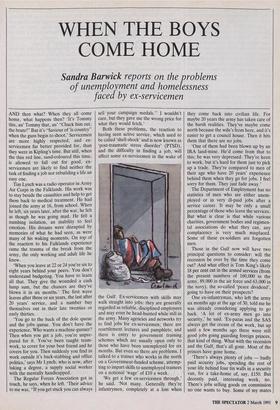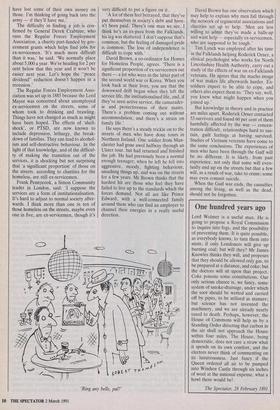WHEN THE BOYS COME HOME
Sandra Barwick reports on the problems
of unemployment and homelessness faced by ex-servicemen
AND then what? When they all come home, what happens then? It's Tommy this, an' Tommy that, an' "Chuck him out, the brute!" But it's "Saviour of 'is country" when the guns begin to shoot.' Servicemen are more highly respected, and ex- servicemen far better provided for, than they were in Kipling's time. But still, when the thin red line, sand-coloured this time, is allowed to fall out for good, ex- servicemen are likely to find neither the task of finding a job nor rebuilding a life an easy one. Tim Lynch was a radio operator in Army Air Corps in the Falklands. His work was to stay beside the casualties and help to get them back to medical treatment. He had joined the army at 16, from school. When he left, six years later, after the war, he felt as though he was going mad. He felt a numbing isolation, an inability to feel emotion. His dreams were disrupted by memories of what he had seen, as were many of his waking moments. On top of the reaction to his Falklands experience came the trauma of the break from the army, the only working and adult life he knew.
`When you leave at 22 or 24 you're six to eight years behind your peers. You don't understand budgeting. You have to learn all that. They give the wounded a cash lump sum, but the chances are they've blown it in six months.' The first wave leaves after three or six years, the last after 20 years' service, and a number buy themselves out in their late twenties or early thirties. `You go to the back of the dole queue and the jobs queue. You don't have the experience. Who wants a machine-gunner? Then when you get a job, you're unpre- pared for it. You've been taught team- work, to cover for your best friend and he covers for you. Then suddenly you find in work outside it's back-stabbing and office politics,' says Mr Lynch, who is now, after taking a degree, a supply social worker with the mentally handicapped.
The Regular Forces Association got in touch, he says, when he left. 'Their advice to me was, "If you get stuck you can always sell your campaign medals." I wouldn't care, but they gave me the wrong price for what they would fetch.'
Both these problems, the reaction to having seen active service, which used to be called 'shell-shock' and is now known as `post-traumatic stress disorder' (PTSD), and the difficulty in finding a job, will affect some ex-servicemen in the wake of the Gulf. Ex-servicemen with skills may walk straight into jobs: they are generally regarded as reliable, disciplined employees and may even be head-hunted while still in the army. Many agencies and networks try to find jobs for ex-servicemen; there are resettlement lectures and pamphlets; and there is entry to government training schemes which are usually open only to those who have been unemployed for six months. But even so there are problems. I talked to a trainer who works in the north on a Government-funded scheme, attemp- ting to impart skills to unemployed trainees on a notional 'wage' of £10 a week.
'We get a few ex-servicemen through,' he said. 'Not many. Generally they're infantrymen, completely at a loss when they come back into civilian life. For maybe 20 years the army has taken care of the harsh realities. They've maybe come north because the wife's from here, and it's easier to get a council house. Then it hits them that there are no jobs.
`One of them had been blown up by an IRA land-mine. He'd come from that to this; he was very depressed. They're keen to work, but it's hard for them just to pick up a trade. They're compared to men of their age who have 20 years' experience behind them when they go for jobs. I feel sorry for them. They just fade away.'
The Department of Employment has no statistics of men who are either unem- ployed or in very ill-paid jobs after a service career. It may be only a small percentage of those who leave the services. But what is clear is that while various charities, government bodies and regimen- tal associations do what they can, any complacency is very much misplaced. Some of these ex-soldiers are forgotten men.
Those in the Gulf now will have two principal questions to consider: will the recession be over by the time they come out? And what effect is Tom King's likely 18 per cent cut in the armed services (from the present numbers of 160,000 in the army, 89,000 in the air force and 63,000 in the navy), the so-called 'peace dividend', going to have on their prospects?
One ex-infantryman, who left the army six months ago at the age of 30, told me he was already considering applying to go back. 'A lot of ex-army men go into security,' he said. 'Ex-paras and the SAS always get the cream of the work, but up until a few months ago there were still good jobs going guarding foreign princes, that kind of thing. What with the recession and the Gulf, that's all gone. Most of the princes have gone home.
`There's always plenty of jobs — badly paid security jobs, spending the rest of your life behind four tin walls in a security van, for a take-home of, say, £150. But decently paid, interesting work, no. There's jobs selling goods on commission no one wants to buy. Some of my mates have lost some of their own money on those. I'm thinking of going back into the army — if they'll have me.'
The difficulty in finding a job is con- firmed by General Derek Crabtree, who runs the Regular Forces Employment Association, a charity part-funded by gov- ernment grants which helps find jobs for ex-servicemen. 'It's much more difficult than it was,' he said. 'We normally place about 5,000 a year. We're heading for 2 per cent below that this year and it won't be easier next year. Let's hope the "peace dividend" reduction doesn't happen in a recession.'
The Regular Forces Employment Asso- ciation was set up in 1885 because the Lord Mayor was concerned about unemployed ex-servicemen on the streets, some of whom took to drinking and brawling. Things have not changed as much as might have been hoped. The effects of 'shell- shock', or PTSD, are now known to include depression, lethargy, the break- down of families. They can lead to alcohol- ism and self-destructive behaviour. In the light of that knowledge, and of the difficul- ty of making the transition out of the services, it is shocking but not surprising that 'a significant proportion' of those on the streets, according to charities for the homeless, are still ex-servicemen.
Frank Pennycook, a Simon Community leader in London, said: 'I suppose the services are a form of institutionalisation. It's hard to adjust to normal society after- wards. I think more than one in ten of those homeless on the streets, maybe even one in five, are ex-servicemen, though it's very difficult to put a figure on it.
'A lot of them feel betrayed, that they've put themselves in society's debt and have- n't been paid. There's one man we see, I think he's an ex-para from the Falklands, his leg was shattered. I don't suppose that's common, but the feeling of damaged pride is common. The loss of independence is difficult to cope with.'
David Brown, a co-ordinator for Homes for Homeless People, agrees. 'There is a significant proportion of ex-servicemen out there — a lot who were in the latter part of the second world war or Korea. When you look back at their lives, you see that the downward drift began when they left the service life, the institutionalised life, and, if they've seen active service, the camarader- ie and protectiveness of their mates. There's a problem coming out without accommodation, and there's a strain on family life.'
He says there's a steady trickle on to the streets of men who have done tours in Northern Ireland. One soldier from Man- chester had gone awol halfway through an Ulster tour, but had returned and finished the job. He had previously been a normal enough teenager; when he left he fell into aggressive, moody, fighting behaviour, smashing things up, and was on the streets for a few years. Mr Brown thinks that the hardest hit are those who feel they have failed to live up to the standards which the forces demand. Not all are like Prince Edward, with a well-connected family around them who can find an employer to channel their energies in a really useful direction.
`Ring any bells, pal?' David Brown has one observation which may help to explain why men fall through the network of regimental associations and charities set up to help. 'Men are less willing to admit they've made a balls-up and want help especially ex-servicemen, who are supposed to be tough.'
Tim Lynch was employed after his time in the Falklands helping Roderick Orner, a clinical psychologist who works for North Lincolnshire Health Authority, carry out a study of the effects of war on ex-Falklands veterans. He agrees that the macho image of war makes life afterwards harder. Ex- soldiers expect to be able to cope, and others also expect them to. 'They say, well, you knew what might happen when you joined up.'
But knowledge in theory and in practice are miles apart. Roderick Orner contacted 53 survivors and found 60 per cent of them harmfully affected by the war — concen- tration difficult, relationships hard to sus- tain, guilt feelings at having survived. Studies of Vietnam veterans have come to the same conclusions. The experiences of men who have been through the Gulf will be no different. It is likely, from past experience, not only that some will even- tually end up on the streets but that a few will, as a result of war, take to crime; some may even commit suicide.
When the Gulf war ends, the casualties among the living, as well as the dead, should not he forgotten.



















































 Previous page
Previous page